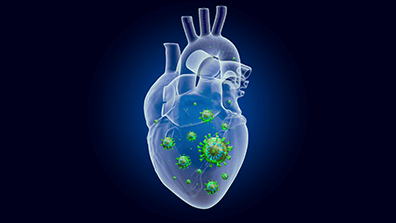New study, comparing recovered athletes to healthy controls, reveals a lower level of myocarditis that previously published research, but cardiac MRI is still important for safe return-to-play decisions.
In a contradiction of research results published this past summer, cardiac MRI shows that heart muscle inflammation in athletes who have recovered from COVID-19 is not as common as previously believed.
In a study published by the American Heart Association, Vanderbilt University Medical Center researchers found that only a small number of athletes among the 59 evaluated suffered lingering cardiac effects. The results will be published in the February Circulation.
“The degree of myocarditis found by cardiac MRI in Vanderbilt athletes was only 3 percent, which is really good news,” said first author Dan Clark, M.D., MPH, a cardiovascular medicine instructor at Vanderbilt. “Since our first evaluation, we have screened almost double that number and the same findings are holding true.”
Previous studies, published in September 2020, reported as many as 15 percent of athletes who recovered from the virus experienced myocarditis.
In this study – the COVID-19 Myocardial Pathology Evaluation in AthleTEs with Cardiac Magnetic Resonance (COMPETE CMR) – Clark’s team compared COVID-19-positive athletes with 60 healthy controls. It is the first study to include healthy controls to assess athletes post-COVID-19.
And, the outcome of the study shows the degree of myocarditis present in recovered athletes was much lower than earlier reports.
“The differences in the findings are extremely important,” he said. “The whole world paused after seeing the alarmingly high rates of myocardial inflammation and edema initially published.”
But, while this is a bright spot of news because the cardiovascular impacts of COVID-19 have been well documented, the study did present some negative results. None of the screening tests evaluated were effective in pinpointing which athletes had myocarditis – and none of those athletes had exhibited any symptoms of the virus.
It was a let-down, Clark explained, because he and his team were hopeful that standard screening tests would be definitive, limiting the need for cardiac MRI to the most necessary instances.
“However, their blood work, clinical exams, EKG, echocardiograms, and other cardiovascular screening were normal,” he said. “All of those traditional screening results would have led us to agree to allow some athletes to participate in a sporting event or practice, while the MRI told a different story.”
Read the full article here: https://www.diagnosticimaging.com/view/cardiac-mri-shows-less-myocarditis-in-athletes-post-covid-19-than-previously-reported


